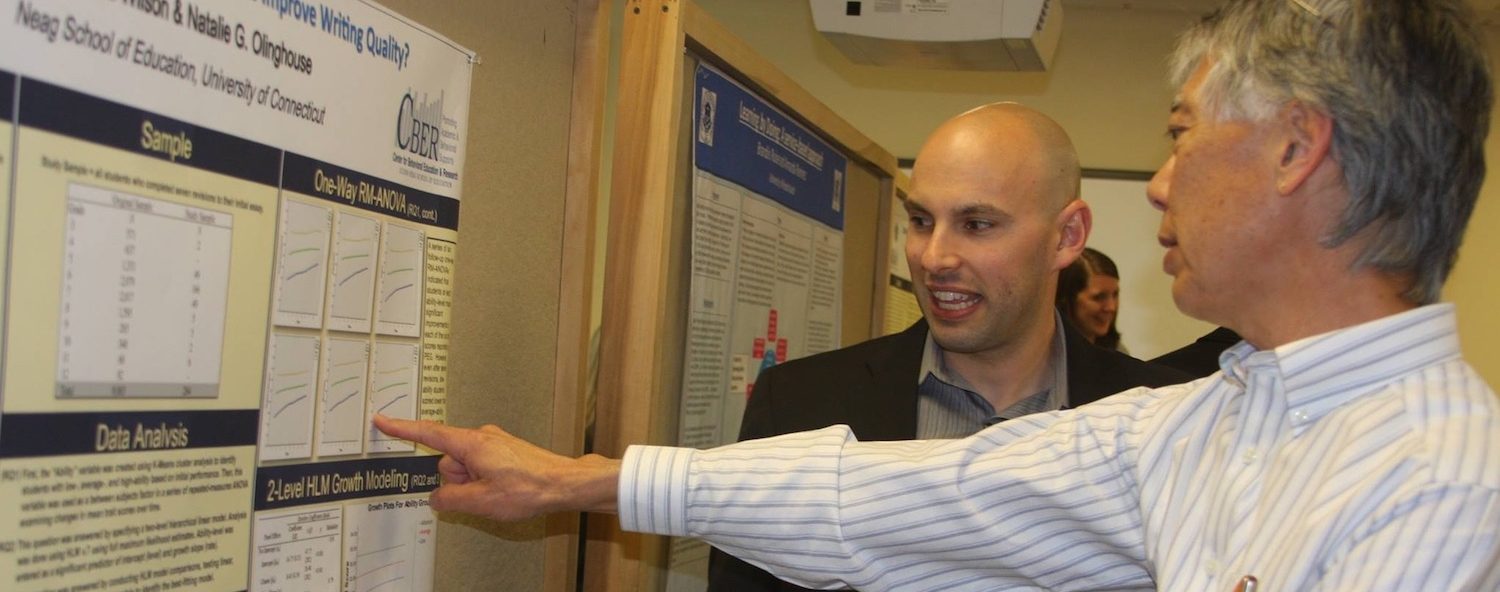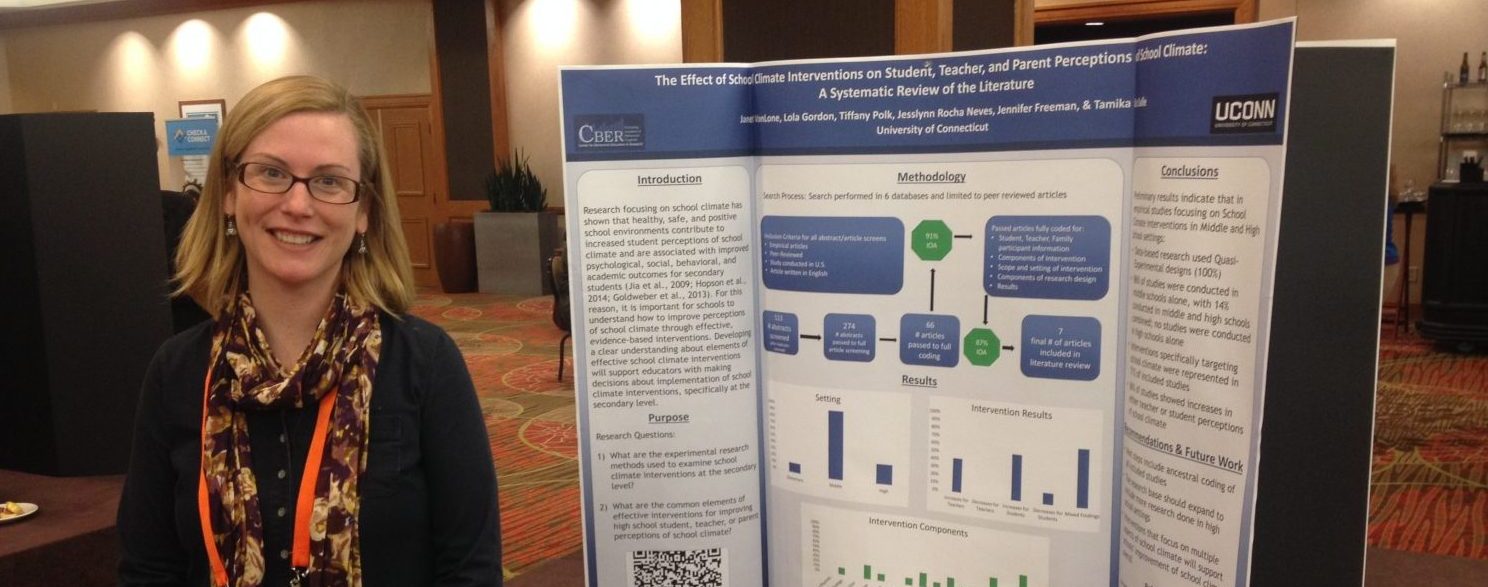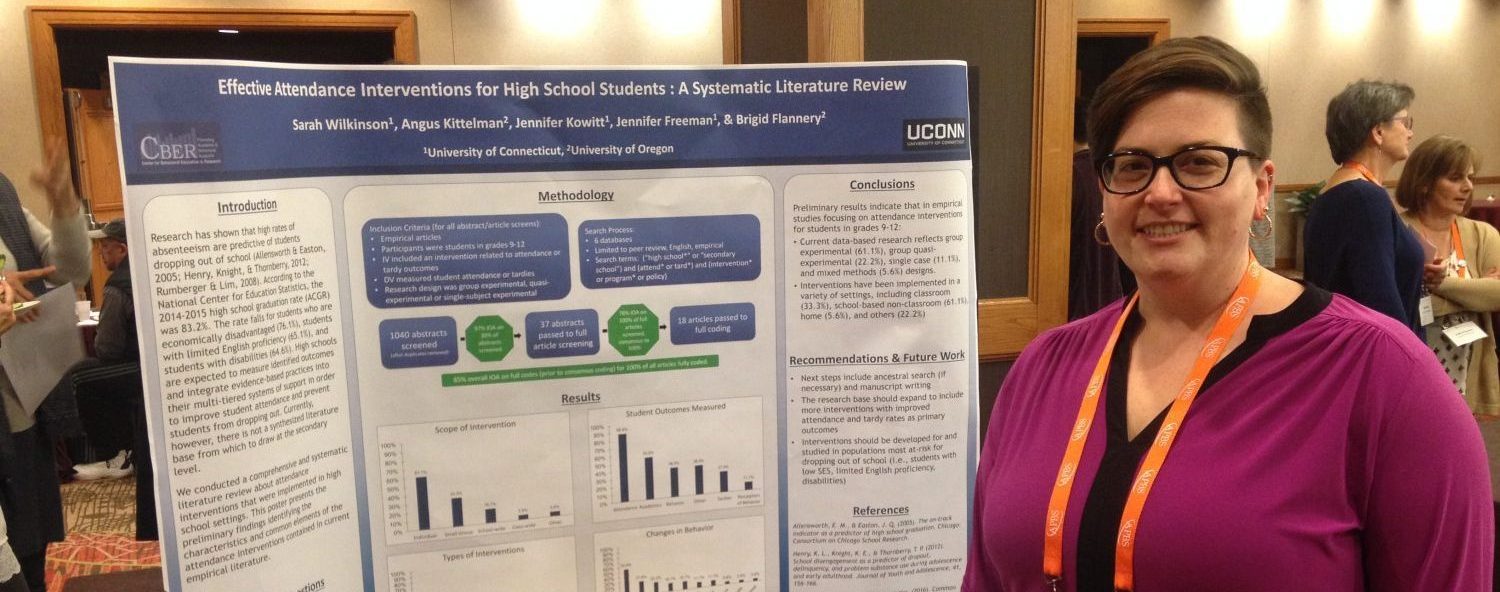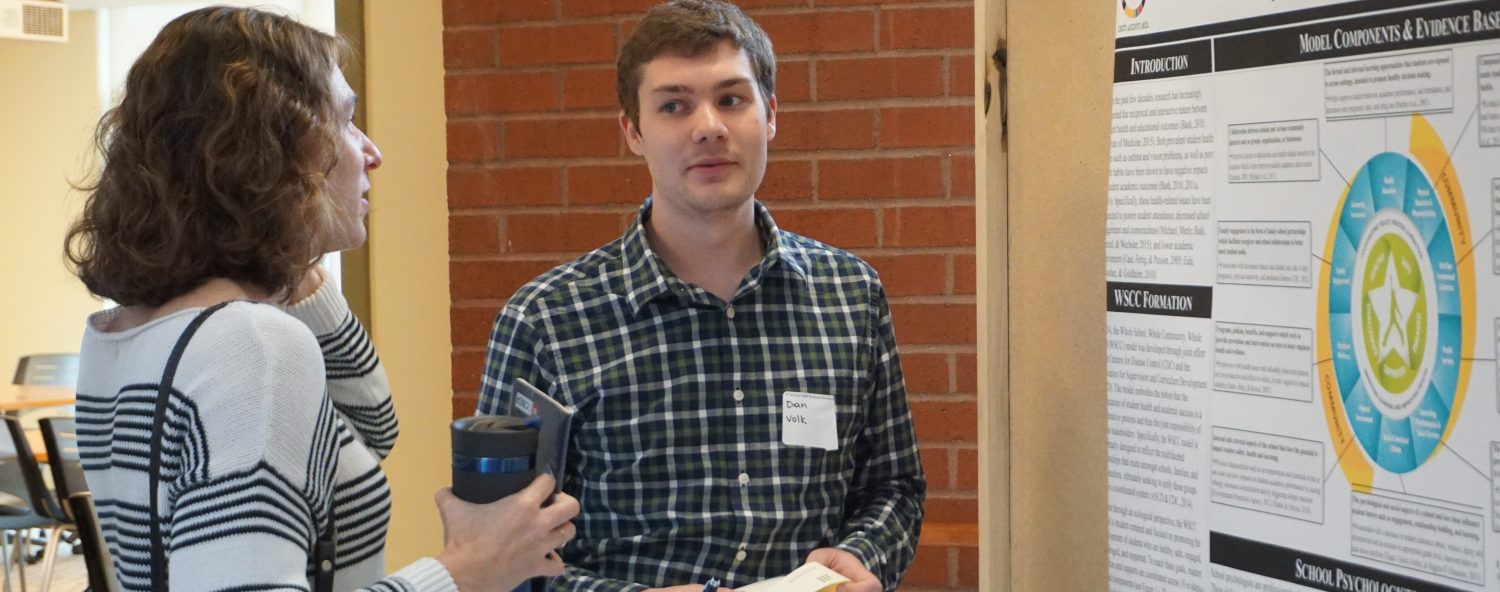



National Technical Assistance Center on Positive Behavioral Interventions and Supports
PIs: Brandi Simonsen, Jen Freeman, and George Sugai
Additional CBER Researchers: Susannah Everett, Adam Feinberg, and Tamika La Salle
The purpose of the Center on PBIS is to define, develop, implement, and evaluate a multi-tiered approach to TA that improves the capacity of SEAs, LEAs, and schools to establish, scale-up, and sustain the PBIS framework to (a) improve supports and outcomes for students with or at-risk for disabilities (Priority 1) and (b) enhance school climate, school safety (Priority 2), and conditions for learning (Priority 3) to promote the well-being of all students.
Sponsor: Office of Special Education Programs (OSEP) and Office of Elementary and Secondary Education (OESE), US Department of Education
Co-Directors: Kent McIntosh (Project Director), University of Oregon; Heather George (Co-Director), University of South Florida; Tim Lewis (Co-Director), University of Missouri; Brandi Simonsen (Co-Director), University of Connecticut
Partners: Susan Barrett, Mid-Atlantic PBIS; Lucille Eber, Midwest PBIS Network; Steve Goodman, Michigan’s Integrated Behavioral and Learning Support Initiative; Don Kincaid, University of South Florida; Kathleen Lane, University of Kansas; Bob Putnam, The May Institute; John Seeley and Jeff Sprague, University of Oregon; Brenda Scheuermann, Texas State University; Mark Weist, University of South Carolina
Project EVI: Early Vocabulary Instruction & Intervention
PI: Michael Coyne
The goal of Project EVI is to develop and evaluate a supplemental vocabulary intervention for kindergarten students at risk for language and learning difficulties within a multi-tiered systems of support framework and collect longitudinal follow- up data through 2nd grade.
Sponsor: U.S. Dept. of Education, Institute of Education Sciences
Partners: Texas A&M, University of Oregon
Intervention & Neuroimaging for Polysyllabic Word Reading: IN/PoWR
PI: Devin Kearns
Develop and test theoretically-different reading interventions for elementary-age children with developmental dyslexia and examine the neurobiological factors and mechanisms that relate to treatment response and resistance.
Sponsor: UConn Academic Plan Research
Partners: Jay Rueckl, Ken Pugh, Peter Molfese
Cross-Cultural School Climate Study
PIs: Tamika La Salle and George Sugai
Our research team has invested significant efforts over the past several years to develop and modify psychometrically sound school climate surveys for students, personnel, and parents. As result, we now have the Georgia School Climate Survey Suite, which includes surveys that target school personnel, parents and guardians, and students from the elementary to high school level. To continue these efforts, we are seeking partnerships with educational agencies beyond the continental United States in order to establish cross-cultural validation of the surveys and to explore the relationships between school climate and PBIS across cultures and contexts. The overarching goal of this research is to establish a set of school climate surveys that can be used internationally to examine perceptions of school climate from key informants and also as a tool to examine the relationships between PBIS implementation and changes in school climate perceptions at the school and sub-group (e.g., race/ethnicity, gender, grade etc.) level as result of school improvement interventions.
Objectives: (a) Establish cross-cultural validation of student, parent, and personnel school climate surveys, and (b) Examine cross-cultural similarities and differences in school climate perceptions and PBIS practices.
Sponsor: Center for Behavioral & Educational Research (CBER) at the University of Connecticut
Project NEEDs2 – needs2.org
Sandra Chafouleas
Current Student Researchers: Emily Auerbach, Taylor Koriakin, Katherine Nelson, Dan Volk, and Huihui Yu
The National Exploration of Emotional/Behavioral Detection in School Screening (NEEDs2) project aims to understand if and how social, emotional, and behavioral screeners are being used in schools, and what factors influence use. Implications of this work will assist school personnel, policy-makers, parents, and community stakeholders in decision-making about social, emotional, and behavioral service delivery in schools.
Sponsor: Institute of Education Sciences (R305A140543)
Partners: Amy Briesch, Northeastern University; Betsy McCoach, UConn Neag School of Education; Jennifer Dineen, UConn Department of Public Policy
Supporting Teachers’ Implementation of Positive Classroom Behavior Support
PIs: Brandi Simonsen and Jen Freeman
Current Graduate Student Researchers: Sang Gyu (Michael) Byun, Sarah Wilkinson, Xin Xu
The goal of this project is to identify efficient and effective professional development (PD) supports to enhance teachers’ classroom management. Across a series of studies, we have developed and refined a targeted PD approach, in which teachers (a) participate in a brief training focused on one classroom management skill, (b) read brief weekly email reminders about the skill use, and (c) self-manage their use of that skill daily. Sample training materials are available at nepbis.org on the “classrooms” tab.
Sponsor: Research Incentive Accounts
High School PBIS and College and Career Readiness
PI: Jen Freeman
Additional CBER Researcher: Allison Lombardi
Current Student Researchers: Laura Kern, Jennifer Kowitt, Graham Rifenbark, Anthony Gambino
We are analyzing data collected from 15 high schools to better understand the relationships between PBIS implementation and outcomes at the high school level both overall and for subgroups of students. In addition to behavioral, attendance and academic outcomes, we are exploring the extent to which PBIS implementation is related to students’ perceptions of their college and career readiness and school climate.
Sponsor: Research Excellence Program
Connecticut K-3 Literacy Initiative (CK3LI)
PIs: Michael Coyne & George Sugai
Current Student Researchers: Kaitlin Leonard, Taylor Koriakin
The goal of the Connecticut K-3 Literacy Initiative is to build state capacity to support schools and districts implement the systems and practices that are necessary to narrow the achievement gap in reading within a multi-tiered or RTI framework. CK3LI includes a model that incorporates a school-wide reading improvement plan, a comprehensive literacy assessment system, high-quality classroom reading instruction (Tier 1), evidence-based supplemental intensive reading interventions (Tier 2 & 3), ongoing coaching, targeted professional development for teachers, and partnerships with parents. Through CK3LI, CBER has supported over 50 schools across 19 districts in CT.
More info on CK3LI: UConn Today
Sponsor: Connecticut State Department of Education
Partners: Connecticut State Department of Education, Commission on Women, Children, and Seniors, HILL for Literacy, Literacy How
Systematic Review of Implementation Data in the Intervention Outcome Literature
PI: Lisa Sanetti
Current Student Researchers: Dan Clark, Allison Fitchelberg, Kate Williamson, Ashley Boyle
Dr. Sanetti and her research team are reviewing the implementation data reported in the treatment outcome literature in school psychology published from 2009-2016. Results of Dr. Sanetti and colleague’s previous review of the school psychology literature from 1995-2008 (Sanetti, Gritter, & Dobey, 2011) suggested that a majority of the published experimental outcome studies did not include a definition of the independent variable and only half included quantitative implementation data. The review currently underway will replicate and expand upon the previous review by also systematically coding the quality of research designs employed.
Assessing the Impact of Disability-Awareness Videos on Faculty Member’s Teaching Effectiveness
PIs: Allison Lombardi
Current Student Researchers: Emily Tarconish and Ashley Taconet
This project will test the effectiveness of disability-awareness videos that were designed to improve faculty members' awareness of the experiences of college students with disabilities, familiarity with available supports for these students, and tools and strategies that promote inclusive teaching. Specifically, we will use a validated survey to measure the effects of the videos on changes in faculty members' disability-related self-efficacy, a concept that encompasses general disability knowledge, familiarity with disability-related supports and principles of universal design, as well as feeling prepared to share this information with other faculty members. Participants will complete pre and post surveys, measuring disability-related self-efficacy before and after and viewing the five videos.
Sponsor: Center for Excellence in Teaching and Learning, University of Connecticut
EnvisionIT in Connecticut: Scaling-Up and Sustaining A Model Transition Curriculum
PI: Allison Lombardi
Current Student Researchers: Jessica Monahan, Emily Tarconish, Keith McLaren, Daniel Volk, Graham Rifenbark
EnvisionIT is an online high school curriculum that teaches 21st Century skills in three core competency areas: information technology (IT) literacy, transition planning, and reading. The reading portion of the curriculum is aligned to the Common Core State Standards in English/Language Arts. EnvisionIT in CT will scale-up the curriculum in Connecticut, with the goals to: (a) integrate EnvisionIT into statewide efforts around the Student Success Plan (SSP) for students with and without disabilities, and (b) encourage students with disabilities at partner schools to use activities/products from EnvisionIT to assist in the writing of their IEP goal statements and meet the reporting needs of Indicator 13.
More info on EnvisionIT: what-is-envisionit
Sponsor: Office of Special Education Programs, OSERS
Partners: Ohio State University
Connecticut Post-School Outcomes for Exiters of Special Education Programs
PI: Allison Lombardi and Joseph Madaus
Current Student Researchers: Dan Volk, Graham Rifenbark, Emily Tarconish, Ashley Taconet, and Katherine Connolly
The goal of this project is to determine the post-school outcomes related to employment, postsecondary education and training of students who received special education services under the Individuals with Disabilities Education Act, as required by Office of Special Education Programs as part of the Bureau of Special Education’s State Performance Plan and Annual Performance Reports.
Sponsor: Connecticut State Department of Education
Ecological momentary assessment (EMA) of teachers’ implementation of school-wide behavioral supports
PI: Lisa Sanetti
Goals: EMA is a form of self-report that (a) reduces recall biases and episodic memory decay, (b) increases ecological validity, (c) allows repeated sampling in real time, and (d) uses technology to automatically sample respondents and save data. The goals of the EMA project are to (1) develop an EMA protocol that is feasible for teachers to complete during the course of instruction, and (2) conduct a study to evaluate the (a) agreement of treatment integrity data collected via EMA self-report and direct observation, (b) agreement between a single EMA sample and composite all EMA samples from a day, and (c) the usability of EMA.
Collaborating Site: University of Massachusetts-Boston
Project VIABLE-II
PI: Sandra Chafouleas
Current Student Researcher: Huihui Yu
In Project VIABLE-II, we are extending single-item DBR scale investigation related to unified validation within a problem-solving model which emphasizes a) validation surrounding screening, b) validation in progress monitoring, and c) foundational psychometric standards. At the end of the project, results will provide clear direction regarding how single-item DBR scales could be incorporated to facilitate defensible, efficient, flexible, and repeatable school-based behavior assessment practices within a problem-solving model.
More info on Project VIABLE-II: directbehaviorratings.org
Sponsor: Institute of Education Sciences (R324A110017)
Partners: Chris Riley-Tillman, University of Missouri; Greg Fabiano, University at Buffalo; Megan Welsh, University of California at Davis; Hariharan Swaminathan, UConn Neag School of Education
NorthEast Positive Behavioral Interventions and Supports
Training-of-Trainers (NEPBIS TOT)
PIs: Brandi Simonsen, Jen Freeman, and George Sugai
Additional CBER Researchers: Susannah Everett
The goal of this project is to develop and evaluate a training-of-trainers model to increase the training capacity for school-wide positive behavioral interventions and supports (PBIS) in CT and other states in the Northeast US.
Sponsor: Connecticut State Board of Education via Subcontract on CT’s State School Climate Transformation Grant (SCTG)
Partners: Kim Traverso, Connecticut State Department of Education; Sarah Jones, State Education Resource Center
Project CALI
PI: Devin Kearns
Project CALI is an Institute of Education Sciences (IES) Goal 2 project to develop a professional development program to support teachers in co-taught content-area classes where general and special educators work together to support students with and without disabilities. In Project CALI, teachers learn a set of strategies to introduce content-area texts to students. They also learn to teach students to work in pairs on a reading comprehension strategy called Getting the Gist, derived from Collaborative Strategic Reading. The goal of the project is to improve the quantity and quality of content-area literacy instruction in middle school classrooms to improve the reading outcomes of students with learning disabilities.
Sponsor: US Dept. of Ed., Institute of Education Sciences
Partners: University of Maryland, Vanderbilt
Classroom Management Assessment Validation
PIs: Brandi Simonsen and Jen Freeman
Current Graduate Student Researchers: Sang Gyu (Michael) Byun, Anthony Gambino, Sarah Wilkinson, Xin Xu
We are conducting a study to validate a classroom management checklist for use as a brief walk-through assessment. The instrument is designed to provide a quick overview of teachers use of evidence-based classroom management strategies.
Massachusetts Positive Behavioral Interventions and Supports (PBIS) Academy
PIs: Adam Feinberg, Brandi Simonsen, and Jen Freeman
Additional CBER Researchers: Susannah Everett
The goal of this project is to create, implement, and evaluate a PBIS Academy to train MA schools in school-wide positive behavioral interventions and supports (PBIS). Priority is given to high-need schools and districts. To date, we have provided training and on-going support to approximately 125 schools in MA.
Sponsor: Massachusetts Department of Elementary and Secondary Education
Partners: The May Institute
Teaching the Vocabulary of Comprehension: A Technology-Enhanced System to Enhance At-Risk 3rd Graders’ Acquisition and Application of Essential Vocabulary (Project IVC)
PI: Michael Coyne
Additional CBER Researcher: Kevin Dalton
Current Student Researchers: Taylor Koriakin
The goal of Project IVC is to develop and evaluate a computerized, interactive vocabulary intervention system that will be responsive to students’ individual needs. The IVC intervention is designed to help students understand the vocabulary often used in comprehension tasks, apply vocabulary in text reading exercises, and expand instructional capacity and learning opportunities through innovative and interactive software.
More info on Project IVC: IVC intervention video
Sponsor: U.S. Dept. of Education, Institute of Education Sciences
Partners: Texas A&M
Intensive Interventions Module Development
PIs: Devin Kearns, Michael Coyne
Current Student Researchers: Katie Leonard
The goal of this project is to develop and evaluate a series of four online courses focused on supporting special educators provide intensive interventions in reading, mathematics, and behavior supports. Modules include an applied coaching component and are designed to be implemented by IHEs and LEAs.
Sponsor: U.S. Dept. of Education, Office of Special Education Programs
Partners: National Center on Intensive Interventions at American Institutes for Research (AIR)